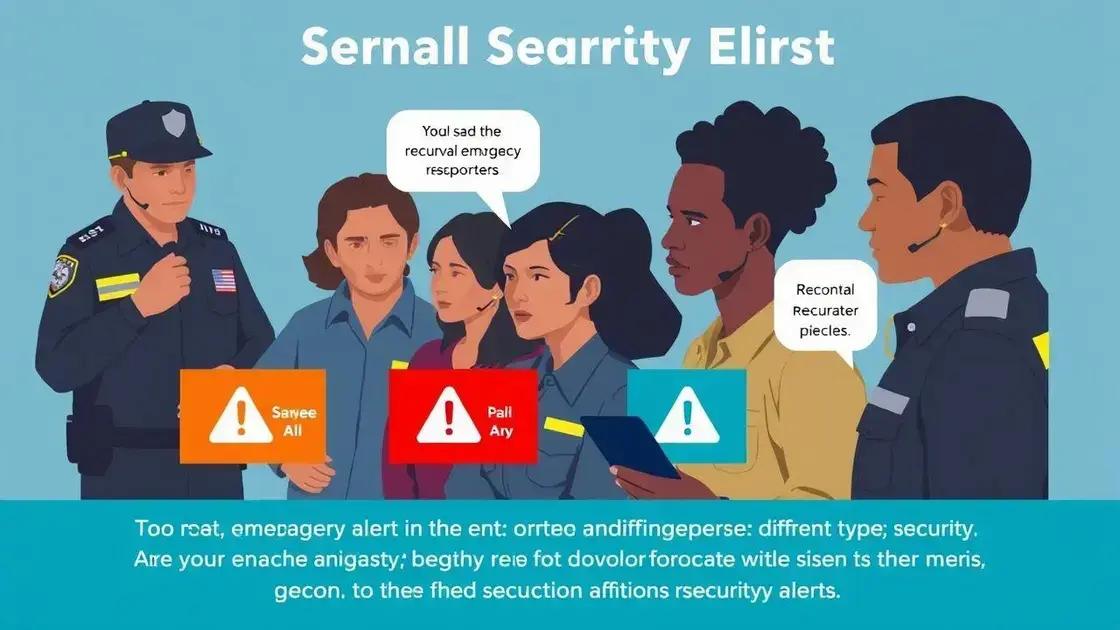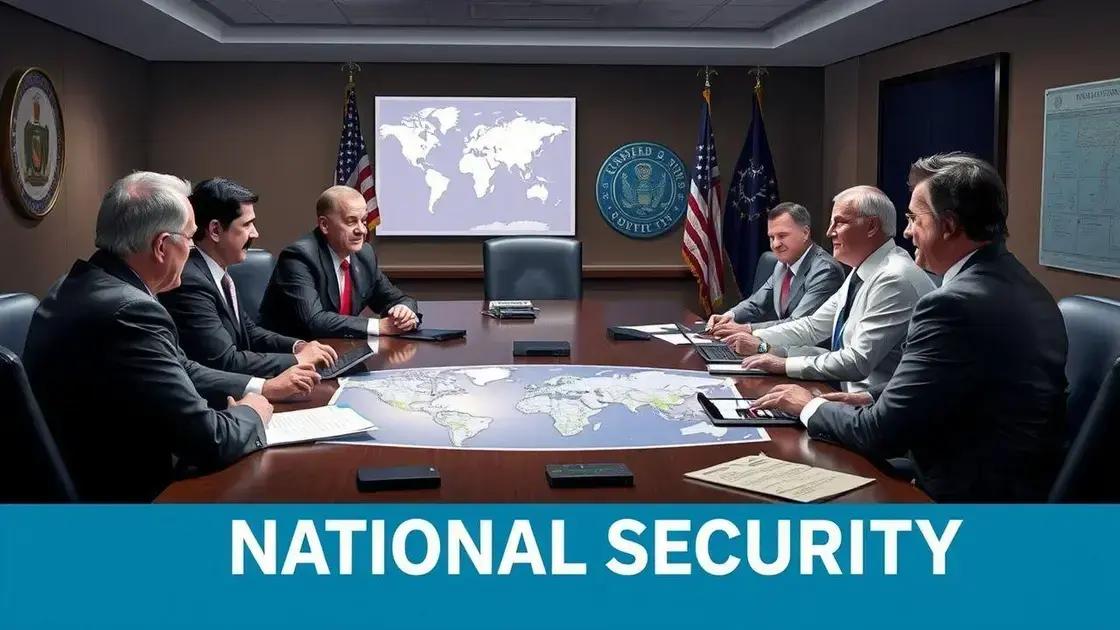National security alerts: what you need to know now

Anúncios
National security alerts are official notifications that inform the public about potential threats or emergencies, helping individuals and communities to prepare and respond effectively to ensure safety.
National security alerts play a crucial role in keeping us informed about potential threats. Have you ever wondered how these alerts affect your daily life? Let’s dive into this essential topic together.
Anúncios
Understanding national security alerts
Understanding national security alerts is essential for staying informed and safe in our fast-changing world. These alerts notify the public about potential threats and help communities take action to protect themselves.
What are national security alerts?
National security alerts are official notices issued by government agencies to inform citizens of imminent threats or dangers. They can range from natural disasters to terrorist activities. Knowing what these alerts mean is vital.
Anúncios
Types of national security alerts
There are several types of alerts that people should be aware of:
- Emergency alerts: These are issued during critical situations, like severe weather or major accidents.
- Terrorism alerts: These warnings inform the public of potential terrorist threats.
- Health alerts: These notifications cover pandemics or outbreaks that could endanger public health.
- Cybersecurity alerts: These alerts warn about potential cyber threats to infrastructure.
Each type serves a unique purpose, and understanding them can help citizens respond appropriately. National security alerts not only keep us safe but also provide guidance on how to take protective actions. For example, during a terrorism alert, authorities may advise people to stay indoors or avoid large gatherings.
Importance of staying informed
Staying updated on national security alerts can make a significant difference. When you know what to expect, you can prepare yourself and your family. Many communities have systems in place for distributing information, such as local news, social media, or community alerts. By being proactive, you help protect those around you.
In today’s world, being aware of national security alerts means being part of a larger safety network. Anyone can create a plan and communicate it with family and friends, ensuring everyone knows how to react in times of crisis.
Types of national security alerts

Understanding the different types of national security alerts is crucial for individuals to respond appropriately to potential threats. Various alerts are issued based on the nature of the risk, providing essential information to help citizens stay safe.
Emergency alerts
These alerts are issued by local and national authorities during critical situations, such as severe weather events or major accidents. Emergency alerts can come through multiple channels, including text messages, TV broadcasts, and social media. They often contain immediate instructions on how to protect oneself.
Terrorism alerts
Terrorism alerts are significant warnings about potential terrorist threats. These alerts usually detail specific information about the threat level, areas that may be affected, and advice on what individuals should do to stay safe. Understanding these alerts can help communities enhance their protective measures.
Health alerts
Health alerts provide important information regarding public health emergencies, such as disease outbreaks or pandemics. They guide communities on preventive measures to reduce the spread of illness. During health crises, the public is advised to monitor updates and take necessary precautions.
- Follow health guidelines: Always adhere to recommendations from health officials.
- Stay informed: Use reliable sources to track information about the outbreak.
- Plan for emergencies: Prepare a health kit with supplies for immediate needs.
Awareness of health alerts is essential for maintaining community safety, particularly during widespread health threats.
Cybersecurity alerts
As technology advances, cybersecurity alerts have become increasingly important. These alerts notify individuals and organizations about potential threats to their online security. They provide essential guidelines on how to protect personal and sensitive information.
By knowing the different types of national security alerts, individuals can better prepare themselves for various situations. Whether it is responding to a natural disaster or safeguarding digital information, being alert is key to ensuring safety and security in our communities.
Why national security alerts matter
Understanding why national security alerts matter is essential for every citizen. These alerts provide critical information that can help us stay safe during emergencies. By being aware of these alerts, we can better protect ourselves and our loved ones.
Alerts save lives
National security alerts can be the difference between safety and danger. When authorities issue a warning, they are often responding to real threats. Following their guidance can reduce risks and help communities respond effectively.
Staying informed empowers communities
When people know what’s happening around them, they can react appropriately. National security alerts keep citizens informed about potential dangers, whether it’s a natural disaster or a terrorist threat. Keeping individuals and communities informed builds resilience and preparedness.
- Awareness: Knowing the status of alerts helps the public stay vigilant.
- Preparedness: Alerts guide people on how to prepare for various emergencies.
- Community collaboration: Information sharing fosters cooperation among residents and organizations.
These aspects of staying informed enhance a community’s ability to survive potential dangers. Additionally, national security alerts often advise on ways to respond to threats, which can include evacuation routes or safety precautions.
Building trust in authorities
National security alerts also play a role in building trust between communities and government agencies. When officials communicate effectively about risks, they foster public confidence. This trust encourages individuals to take alerts seriously and act accordingly.
By recognizing why national security alerts matter, we create a culture of safety and preparedness. Being engaged with alerts allows us to protect ourselves during crises and enhances our community’s resilience. Everyone has a role to play in safety, and awareness is the first step toward making a difference.
How to stay updated on alerts

Staying updated on national security alerts is vital for safety. There are many ways to receive timely information. Being proactive in monitoring various sources can help ensure you are always informed.
Use technology to your advantage
In today’s digital age, technology provides quick access to important alerts. Government agencies often use apps and websites to share real-time information. These platforms can deliver alerts directly to your phone or email.
Subscribe to alerts
Many local authorities offer subscription services for alerts. Signing up for email or text notifications can keep you informed about emergencies specific to your area. To stay ahead, consider subscribing to the following:
- Local government alerts: Most cities have their own alert systems.
- Weather alert systems: Services like NOAA provide crucial updates about severe weather.
- News outlets: Local news websites and channels often report on national security alerts.
Engaging with these services ensures that you receive the latest information as soon as it becomes available.
Follow social media channels
Social media platforms play a significant role in distributing information quickly. Following official accounts of local and national government agencies on platforms like Twitter or Facebook can provide rapid updates. Many agencies use these channels to notify the public of ongoing threats or updates.
In addition, community groups often share relevant information. Joining neighborhood or community Facebook groups can give you insight into local safety matters as they arise. This community engagement fosters awareness and safety.
Stay aware of surroundings
While technology is essential, staying aware of your surroundings also plays a key role. Be vigilant and attentive to changes in your environment. If you notice anything suspicious or concerning, reach out to local authorities. Combining awareness with technology can enhance your overall safety.
By following these strategies, you can effectively stay updated on national security alerts. Remember, staying informed is your first line of defense.
Personal safety measures during alerts
Implementing personal safety measures during alerts is crucial for protecting yourself and your loved ones. When an alert is issued, knowing how to respond can make a significant difference.
Stay informed
Keeping yourself updated during an alert is the first step in ensuring safety. Use multiple sources such as news websites, official social media accounts, and emergency alert systems. Reliable information helps you understand the nature of the threat and the required actions.
Create an emergency plan
Having a well-thought-out emergency plan is essential. This plan should outline how to respond to various types of alerts. Consider including the following elements in your plan:
- Evacuation routes: Know the safest and quickest routes to leave your area.
- Meeting points: Choose a designated location for your family to reunite.
- Communication methods: Establish ways to contact each other, such as through texting or social media.
A clear plan allows everyone to act quickly and efficiently, reducing stress during emergencies.
Prepare an emergency kit
Your emergency kit should contain essential supplies. This allows you to be ready for various situations. Essential items include:
- Water: Keep at least one gallon per person per day for several days.
- Non-perishable food: Stock up on items that do not require refrigeration.
- First aid supplies: Include bandages, antiseptics, and any necessary medications.
Having these items handy can significantly ease the challenges presented during an alert.
Stay calm and focused
During alerts, it’s natural to feel anxious. However, it is essential to stay calm and focused. Anxiety can lead to poor decision-making. Take deep breaths and remind yourself to follow your emergency plan. This helps you think clearly and act in the best interest of your safety.
By implementing these personal safety measures during alerts, you enhance your chances of staying safe and secure. Preparation empowers individuals and communities, leading to better outcomes in times of crisis.
The role of the government in national security

The government’s role in national security is fundamental to maintaining the safety and well-being of its citizens. It involves various agencies and strategies to protect the nation from threats.
Creating and enforcing policies
One of the primary responsibilities of the government is to develop and enforce policies related to national security. These policies establish guidelines for responding to threats and assessing risks. They include regulations on borders, immigration, and intelligence gathering. By having clear policies, the government can effectively manage security challenges.
Coordination among agencies
National security is a shared responsibility among different government agencies. Coordination between agencies like the Department of Homeland Security, the FBI, and local law enforcement is crucial. Each agency has a unique role, but together they form a comprehensive approach to security. For example:
- Intelligence gathering: Agencies collect and analyze data to identify potential threats.
- Emergency response: Local law enforcement and emergency services work together during crises.
- Public safety initiatives: Governments create public awareness campaigns to educate citizens on safety measures.
This teamwork enhances the effectiveness of national security efforts and ensures a swift response in times of danger.
Engaging with communities
Another important aspect of the government’s role is engaging with communities. By fostering good relationships between authorities and citizens, trust can be built. This engagement allows for better communication about potential threats. Citizens can report suspicious activities or concerns, which helps increase overall security.
Governments often hold community meetings and workshops to educate the public about safety practices. This community involvement empowers individuals to participate in their own safety and reinforces the importance of vigilance.
Funding and resources
The government allocates resources to support national security initiatives. This funding is crucial for training personnel, developing technology, and maintaining infrastructure. Ensuring that agencies are well-funded allows them to operate effectively and respond to any emerging threats.
Through these various roles, the government plays an essential part in securing the nation. Understanding the role of the government in national security helps citizens appreciate the efforts made to ensure their safety and enhances community cooperation with authorities.
FAQ – Frequently Asked Questions about National Security Alerts
What are national security alerts?
National security alerts are official notifications issued by government agencies to inform the public about potential threats or emergency situations.
How can I stay updated on national security alerts?
You can stay updated by subscribing to local government alert systems, following social media accounts of authorities, and utilizing news outlets for timely information.
What should I include in my emergency plan?
An emergency plan should include evacuation routes, meeting points for family members, and communication methods to keep everyone informed during a crisis.
Why is community engagement important in national security?
Community engagement helps build trust between citizens and officials, making it easier to share information and respond effectively to threats.






